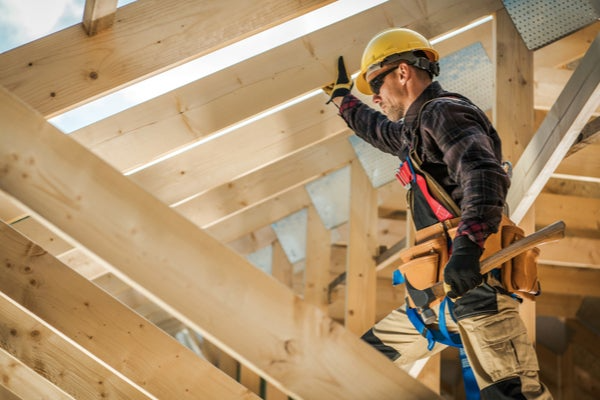What is a Builder’s Home Warranty?

A builder’s home warranty is essential when buying a newly constructed home. Before signing a contract, learn what a builder’s warranty on new homes could cover and what it won’t.


A builder’s home warranty is essential when buying a newly constructed home. Before signing a contract, learn what a builder’s warranty on new homes could cover and what it won’t.
What’s the difference between a home builder’s warranty and a home warranty?
If you’re thinking of buying a newly constructed home, it’s important to know the difference between a builder’s home warranty and a standard new home warranty.
A builder’s home warranty applies to new home construction or a remodel that is completed by a builder, who, in this case, pays for the home warranty. Unlike a home warranty, which is purchased by the homeowner and covers essential appliances and systems in your home, a house builder’s warranty on a new home is provided by the builder or from a third-party provider. It accounts for any issues with materials, central in-home systems that were installed by the construction team, or other structural elements.
Both warranties are different from homeowners insurance, a separate policy that most homeowners are required to purchase when they buy a house. It provides coverage for things that might happen, like floods, fire, theft, and more. Learn more about the differences between home warranty and insurance in our Home Insurance vs. Home Warranty blog post.
What is the builder’s warranty period?
A builder’s warranty on new homes offers limited coverage on the materials and workmanship for a specific amount of time. The length of the warranty will depend on what features your home has.
For example, a one-year builder’s warranty for new construction will often cover workmanship and materials. A two-year warranty will most likely cover HVAC, electrical, and plumbing. On average, builder’s warranties will last between six months and two years.
Will a builder’s home warranty cover structural damage?
Some builder’s warranties may offer up to 10 years of coverage for any major structural defects that occur during that time frame. Structural warranties cover defects that are considered to be damages to the home that make it unsafe to live in.
A warranty will differ from builder to builder, so it’s important to know what it will cover and what it won’t before signing a contract.
What is covered in a builder’s warranty?
Negotiating a home builder’s warranty can be a lengthy process. A builder wants to limit their responsibility more times than not, so it’s up to you to ensure your home has as much coverage as possible. Before signing a contract, be sure to ask your builder the following questions:
A builder’s warranty on new homes will typically include limited coverage on any supplies used to build your home and items they constructed. These will often include:
Thinking about coverage?
Sounds like a plan. Find the warranty that fits you best.
What is not covered in a typical home builder warranty?
It can be frustrating thinking something is covered by a warranty when it turns out not to be one of the home builder’s responsibilities. Doing a home inspection and walk-through prior, during, and right after building is complete can help avoid issues with responsibility.
Weather-related issues and normal wear-and-tear are generally not included in a builder’s home warranty. Other items that a builder’s warranty may not cover include:
Are builders required to provide a home warranty?
Whether or not your new home comes with a builder’s warranty depends on the state in which your new home is located. For example under the New Jersey Uniform Construction Code, every new home sold in New Jersey is required to come with a builder’s warranty. Whereas Texas has no regulations around builder’s warranties—which becomes risky for the homeowner.
If you have a loan with the Federal Housing Authority or the Department of Veterans Affairs, your builder is required to purchase a third-party warranty. Check with your state's department for more information on new home warranty provider mandates.
Terms of the builder’s warranty
Submitting a warranty claim correctly and on time will help ensure coverage under a house builder’s warranty. If something breaks during the warranty period, but you wait to report the issue until it expires, your claim could be voided.
Another pain point you might face when submitting a warranty claim is the question of who is at fault. For example, if you decide to install a satellite on your roof and cause damage in the process, then you could be responsible for repairs, even if the builder’s warranty covers your roof.
For coverage for home systems and appliances that a home builder’s warranty won’t cover, consider an American Home Shield® home warranty. From broken appliances to issues with electrical systems, American Home Shield can help protect your budget against costly, unexpected repairs. Purchasing and owning a home is expensive, so make sure you protect your investment and enjoy the added peace of mind that a home warranty provides.
While you’re at it, be sure to browse other homeowner topics like increasing the value of your home and giving your house more curb appeal.
Maintaining smart home security gadgets is made easy with an American Home Shield plan.

AHS assumes no responsibility, and specifically disclaims all liability, for your use of any and all information contained herein.
Have a plan for your home when things don't go according to plan
Shop Home WarrantiesStaging